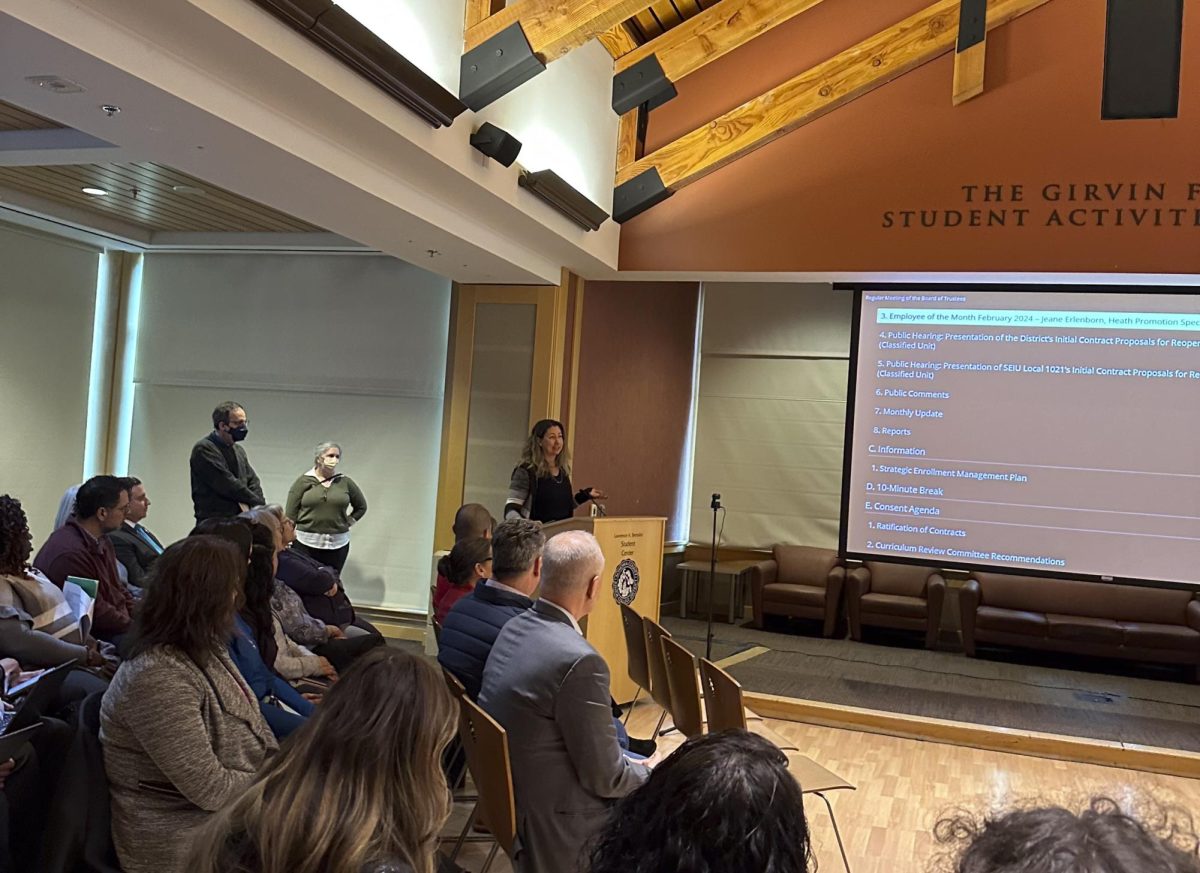The Academic Senate’s Resolution in Support of Trans Students, new additions to Canvas and student-worker pay were all brought to the attention of the Santa Rosa Junior College Board of Trustees Feb. 13 meeting.
Nancy Persons, president of the Academic Senate, reported on the ongoing discussion regarding SRJC’s Resolution in Support of Trans Students that began in the Academic Senate meeting on Jan 17.
“This discussion has become very emotional, at the last meeting many painful things were said,” Persons said.
Recently, trans students at SRJC have reported feeling isolated, unsafe in dorms, and frustrated with the administration’s handling of discrimination complaints. To resolve these issues, the resolution calls for the Board to implement policies that better support SRJC’s trans students by providing cultural competency training to resident associates and revising the student complaint and grievance process. The resolution also calls for the SRJC to provide the Queer Resource Center with access to data required for the center to better support LGBTQ+ students.
Another issue the resolution covers is the California Community College Athletics Association’s policies that sponsors say negatively affect trans student-athletes. Sponsors say the CCCAA supports harmful policies that may be traumatizing to trans students such as requiring students who have not begun to medically transition to play on the team of their assigned sex at birth.
According to Persons, guest speakers at the Feb. 7 Academic Senate meeting said that SRJC still needs to implement the recommendations from the 2016 Campus Pride Index Survey. The Campus Pride Index Survey suggested that SRJC administration be more involved in supporting LGBTQ+ students and that they consider developing trans-sensitive housing options on campus.
“The district needs to establish a standing committee on inclusion, diversity, equity, anti-racism and accessibility,” Persons said. According to Persons, the Academic Senators have brought this idea to Dr. Garcia and will present it to the college council for consideration.
Kimberly Stark, dean of Disabled Students Programs and Services, reported on new resources on Canvas that will benefit both students and faculty.
B:CARE is a new course being added to Canvas that will educate SRJC faculty and staff on the best strategies to help students who are showing high levels of stress. The course can be completed at the faculty member’s leisure to allow them to revisit points of interest.
Now located on Canvas for students is the Wellness Central, which was created for community college students by the California Community Colleges Association, but has been retooled to better serve SRJC students, and will provide students with multiple free health and wellness resources.
Under the “Modules” section of the Wellness Central, students can find resources that cover a broad range of topics, from assistance in dealing with anxiety to resources assisting students with their financial wellness.
The Wellness Central and other support services are all located under the new “Cub Hub” section, which is located on the left-hand side under the help section in Canvas.
Kimberly Starke also informed the Board of Trustees attendees that Mental Health resources have been grouped onto a single page on the SRJC website to make it easier for students and staff to access them.
Student Trustee, Logan Warren, focused on the currently low student wages at the SRJC during the Student Trustee Report.
Warren began by expressing gratitude that SRJC administration has worked toward increasing student wages, but reminded the Board that student wages are still quite low. Currently, SRJC student wages are lower than that of the City of Santa Rosa and Petaluma minimum wage of $17.45 an hour.
“On multiple levels, this isn’t good for the students or the college,” Warren said. “Why would they [students] want to work here [SRJC] when they can get paid more working almost anywhere else?”
Warren said he wasn’t surprised that SRJC is currently struggling to attract student workers since they are not offering the same minimum wage as the surrounding cities.
Warren ended his report by expressing an understanding that this issue can not be resolved with a “snap of the fingers,” but is looking forward to working with the Board to resolve this issue and offer more competitive wages for students.




